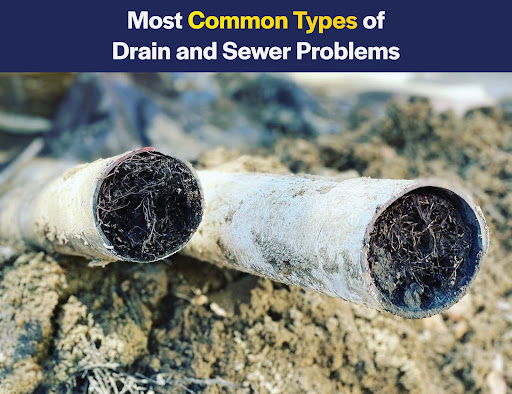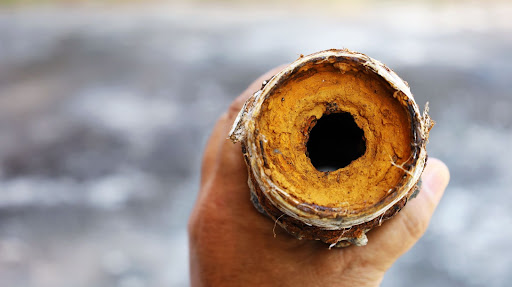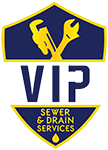
Drain and sewer problems are not on anyone’s desired to-do list. But left untreated, even the smallest issue can overtime create a much bigger problem. But what are the most common drain and sewer problems home and business owners deal with? How to prevent these problems from occurring and handle them if they do? Let’s find out!
Tree Root Infiltration
Your drain pipes and sewer line are like a bountiful utopia for tree roots in search of water, nutrients, and oxygen they require. Roots that reach such a rich source of nourishment can quickly begin to settle in, grow, spread and cause serious damage to your plumbing system. Because all this happens underground, out of the reach of your eyes, it’s a common problem for many home and business owners. Some of the most common signs of roots entering your sewer line are, slow draining toilets, gurgling sounds, unpleasant sewer odors and even sinkholes
How to prevent this?
There are several ways you can prevent this from occurring on your property, the first – being mindful about the types of plants and trees you plant in your yard and where you choose to do so. If you are concerned this may be an issue for your existing landscaping, there are certain barriers and safe chemical treatments that are designed to prevent tree roots from growing near your drain and sewer lines.
Solution:
If you know for sure or highly suspect that tree roots have already entered your plumbing system, it’s important to take action immediately as this is a problem that will quickly escalate. Discuss your concerns with your plumber as soon as possible and schedule a hydro jetting service, which will blast away the roots in your pipes.
Drain and Sewer Clogs
Drain and sewer clogs can be caused suddenly, when something you should not flush goes down the toilet, or over time as grease, food particles, hair and waste gradually build up, causing a blockage. A clog left unattended can eventually cause a leak and in more extreme cases, it can provoke a pipe to burst. This is especially true in the cold winter months, when water that cannot pass through, freezes, expands and damages your pipe. A slow draining fixture is one of the first symptoms of an obstruction somewhere down the drain or sewer pipe.
How to prevent this?
Be kind to your drains by following daily best practices to keep your drain pipes clean and well maintained. One of these includes being mindful about what you flush. Just because something is labeled ‘flushable’ really doesn’t mean it should get flushed down your toilet.
Items that should never get flushed include:
- “Flushable” wipes
- Cotton swabs
- Dental floss
- Paper towels
Because buildup can be created over time from regular use, it’s a good idea to have your drains cleaned regularly and stick to a good plumbing maintenance plan.

Solution:
There are several methods of drain cleaning and depending on the severity of the clog and the state of your drain pipes, your professional plumber will be able to advise on the method best suitable for your specific circumstances. Dealing with a plumbing emergency? The trained professionals at VIP Sewer and Drain services are available 24/7 for emergency plumbing situations!
Pipe corrosion or deterioration
Pipe corrosion occurs in metal pipes such as steel or copper. Your plumbing system can be at risk of this if it was installed 50 or more years ago. Pipes installed during that time period were often coated with an interior layer of zinc, which was believed to help prevent corrosion. Over time it turned out that these pipes are actually prone to rusting and mineral buildup. Rusty pipes are more susceptible to burst, leak and contaminate your water.
Signs that your pipes are corroding include:
- Discolored water
- Smelly water
- Metallic tasting water
How to prevent this?
One way to prevent your pipes from corroding is by avoiding the use of chemical drain cleaners. Chemical cleaners rely on strong and dangerous acids that will basically destroy anything and everything they come into contact with, including your pipes, leading them to corrode. Leaving clogs unattended is another plumbing mistake that can cause your pipes to corrode and eventually leak.
Solution.
If you suspect your pipes are corroded or have a very old plumbing system, call a plumber to perform an inspection and establish your plumbing system’s state from the inside. Once corrosion has been identified the next step would be to remove and replace the affected area or repipe your entire house. While this is a costly and time consuming endeavor, old and corroding pipes are a serious health hazard that should not be left unaddressed.
Pipe Leaks / Pipes Bursting
Pipe leaks eventually lead to pipes bursting and are most often caused by unresolved drain clogs and buildup.
Common signs of a hidden water leak include:
- Stained, damaged or sagging walls, ceiling or floors.
- Mold or mildew
- A sudden jump in your water bill
- Peeling or blistering paint or wallpaper
- A lingering, musty smell
On the other hand pipes can also burst if they are loosely installed, if they freeze during the winter months or if the water pressure in your pipes builds and becomes too high.

How to prevent this?
Water leaks are pretty common so having an annual inspection of your plumbing system will help keep your pipes in good shape and address any issues in their early stages, before they create a leak. Be mindful of what causes water leaks, such as rapid temperature drops, root infestation, broken seals, clogged pipes or regular wear and tear.
Preparing your pipes for the cold winter months by insulating them properly, will aid in the prevention of freezing and bursting, when the temperatures drop.
Solution.
If you suspect you may have a water leak somewhere in your plumbing system, call a plumbing professional to perform a water leak detection service. The same applies if a pipe in your plumbing system bursts.
A burst pipe can quickly cause severe water damage so it’s important to take action and call a plumber as soon as possible. While you wait for the professionals to arrive, make sure all electrical appliances near the area of the flooding are turned off, if it is safe to do so. This includes ceiling fans and any light fixtures. Next, stop the water flow by switching your water supply completely off.
If possible, locate the pipe that has burst, document and take clear pictures of the damage. This will come in handy, should you decide to file a claim with your insurance company.
While these plumbing issues are quite common, they should not be overlooked as they can escalate to much more dangerous, damaging and costly problems. If you have any emergency plumbing need, simply call our 24 hour emergency service line
866.222.1753


